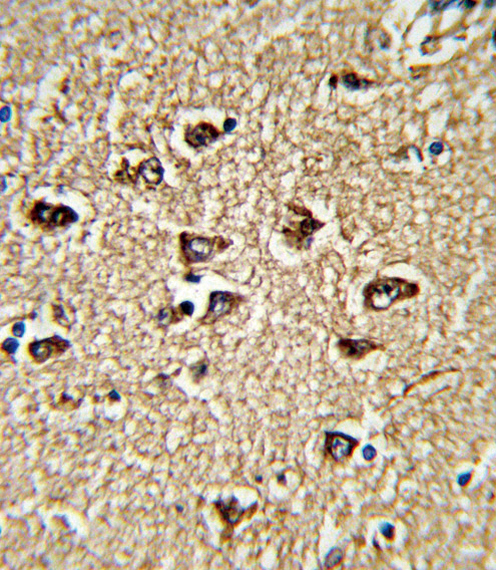

| WB | 1/1000 | Human,Mouse,Rat |
| IF | 咨询技术 | Human,Mouse,Rat |
| IHC | 1/100-1/500 | Human,Mouse,Rat |
| ICC | 技术咨询 | Human,Mouse,Rat |
| FCM | 咨询技术 | Human,Mouse,Rat |
| Elisa | 咨询技术 | Human,Mouse,Rat |
| Aliases | Protein bicaudal C homolog 1, Bic-C, BICC1 |
| Entrez GeneID | 80114 |
| WB Predicted band size | 104.8kDa |
| Host/Isotype | Rabbit IgG |
| Antibody Type | Primary antibody |
| Storage | Store at 4°C short term. Aliquot and store at -20°C long term. Avoid freeze/thaw cycles. |
| Species Reactivity | Human |
| Immunogen | This BICC1 antibody is generated from rabbits immunized with a KLH conjugated synthetic peptide between 80-107 amino acids from the N-terminal region of human BICC1. |
| Formulation | Purified antibody in PBS with 0.05% sodium azide. |
+ +
以下是关于BICC1 (N-term)抗体的3篇参考文献及其简要摘要:
---
1. **文献名称**: *"BICC1 expression is associated with renal cyst development in zebrafish and mice"*
**作者**: Tran U. et al. (2010)
**摘要**: 本研究通过Western blot和免疫组化技术,利用BICC1 (N-term)抗体检测了斑马鱼和小鼠肾脏组织中BICC1蛋白的表达,发现其在多囊肾病模型中显著上调,提示BICC1通过调控细胞极性参与囊肿形成。
2. **文献名称**: *"The RNA-binding protein BICC1 regulates cell signaling pathways in development"*
**作者**: Wessely O. et al. (2011)
**摘要**: 研究使用BICC1 (N-term)抗体进行免疫共沉淀(Co-IP)和免疫荧光染色,发现BICC1通过结合靶mRNA调控Wnt/β-catenin信号通路,影响胚胎发育和器官形成。
3. **文献名称**: *"BICC1 promotes tumor progression in ovarian cancer via AKT signaling activation"*
**作者**: Huang L. et al. (2015)
**摘要**: 通过BICC1 (N-term)抗体的Western blot分析,揭示了BICC1在卵巢癌细胞中的高表达,并证明其通过激活AKT通路促进肿瘤侵袭和转移,为癌症治疗提供了潜在靶点。
---
以上文献均明确提及或间接通过实验方法(如Western blot、免疫荧光等)使用BICC1 (N-term)抗体,涵盖其在发育生物学、疾病模型及肿瘤学中的应用。如需具体DOI或期刊信息,可进一步补充关键词检索。
The BICC1 (N-term) antibody is a research tool designed to detect the N-terminal region of the BICC1 (BicC Family RNA Binding Protein 1), a protein implicated in developmental processes and disease. BICC1 is an RNA-binding protein containing KH domains, which regulate mRNA stability, translation, or localization. It plays critical roles in embryonic development, particularly in kidney organogenesis, ciliogenesis, and left-right patterning. Dysregulation of BICC1 is linked to polycystic kidney disease, cancer, and metabolic disorders.
The antibody specifically targets epitopes within the N-terminal region of BICC1. enabling researchers to study its expression, localization, and interactions in various tissues. This region often harbors functional domains critical for protein-protein or protein-RNA interactions, making the antibody valuable for investigating BICC1's regulatory mechanisms. It is commonly used in techniques like Western blotting, immunohistochemistry, and immunofluorescence to analyze BICC1 expression in cellular or animal models. Studies leveraging this antibody have contributed to understanding BICC1's role in Wnt signaling, cyst formation, and its interplay with microRNAs or other post-transcriptional regulators. Validation typically includes testing in BICC1-knockout controls to confirm specificity.
×